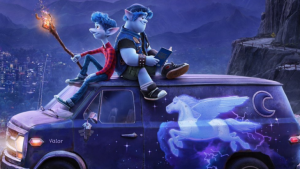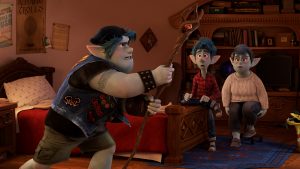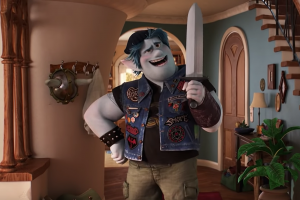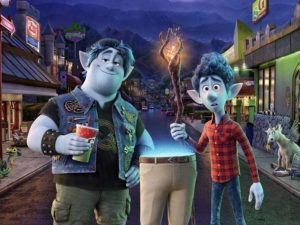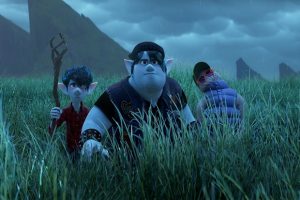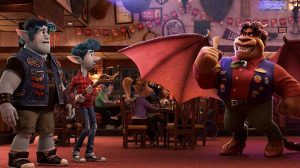SPOILERS FOR HARLEY QUINN SEASON 2 AND SHE-RA SEASON 5!
Happy Pride Month! As we begin to celebrate the history and culture of the LGBTQ+ community, I thought it would be interesting to look at what the community has accomplished already in 2020, through the mediums of TV and film. Though coronavirus has prevented many inclusive films from making it to theaters this year, there are still plenty that did get there before the world went on lockdown, and many more that have released on streaming. For this breakdown, we’ll be looking at the setbacks the LGBTQ+ community suffered early in the year, and three outstanding breakthroughs in representation that both occurred just last month which could signal big changes in the industry.
Of course, I should note that this is not, by any means, a comprehensive list of every film or TV series released this year that touches on any of these issues – this is merely a discussion of some especially significant incidents spanning the course of the past several months, which I feel present a fairly accurate depiction of the year’s many ups and downs as a whole.

2020 opened on a promising note with Marvel President and head producer Kevin Feige boldly announcing that the Marvel Cinematic Universe would welcome its first ever transgender superhero in the very near future, at a Q&A where he used the words: “Yes, absolutely. Yes.” Unfortunately, the moment was irreparably tarnished when it was revealed that Feige hadn’t realized the question was specifically about transgender superheroes, and only meant an LGBTQ+ superhero was coming very soon. That doesn’t necessarily mean that transgender heroes aren’t going to appear in the MCU at some point (there are rumors that a transwoman superheroine, Sera, could appear in either the Loki Disney+ series or Thor: Love And Thunder), but it does cast doubt on when that will ever happen. It was a bad omen, heading into the new year.
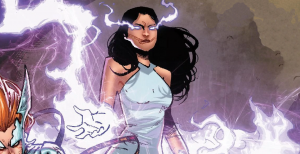
In February, Marvel’s rival DC had a golden opportunity to explicitly confirm that one of their most major characters was canonically LGBTQ+ – but instead, their hyped-up zany comedy Birds Of Prey danced around the issue of sexuality, giving only eagle-eyed viewers a blink-and-you’ll-miss-it nod to lead character Harley Quinn’s bisexuality in an animated sequence, while simultaneously hinting through stereotypical mannerisms that flamboyant, misogynistic villain Roman Sionis and his partner-in-crime were a gay couple. A lesbian character in the film, Renee Montoya, did play a large role and had an ex-girlfriend who also showed up, which makes Birds Of Prey something of a “one step forward, two steps backward” sort of situation.
Around the same time, the Disney+ streaming platform came under fire for a slew of reasons, most of which involved the service’s attempts to whittle down their roster of upcoming original content in a manner which many saw as discriminatory towards series’ with a focus on LGBTQ+ issues. While Disney+ didn’t do this with all of their shows (High School Musical: The Musical: The Series and Diary Of A Future President both featured openly LGBTQ+ characters), they did make the decision to move their hotly-anticipated Love, Victor (a spinoff of 20th Century Fox’s successful gay romance Love, Simon, obtained during the Disney/Fox merger) to Hulu, deeming it too mature for their own platform. One of the service’s most high-profile original series’, a sequel to the Lizzie McGuire Disney Channel series, was shut down entirely – with some sources saying that it was due to the way in which the story tackled matters of sexuality. It didn’t take long before the whole situation had raised a very interesting discussion about what is “family-friendly”, but that hasn’t saved Love, Victor from heading to Hulu, nor has it resurrected Lizzie McGuire.

In March, as the world started falling apart thanks to coronavirus, the Pixar film Onward was lost in the catastrophe, and moviegoers barely had any time to acknowledge the fantastic animated feature or its moment of LGBTQ+ representation – a moment that would have been great, had it not been leaked to the press by eager journalists prior to the film’s release and subsequently massively overhyped. In the film, a cop played by openly lesbian actress Lena Waithe briefly mentions her girlfriend in a single line of dialogue. Despite how brief the moment was, the film was still boycotted by conservative groups like One Million Moms and banned by several Middle Eastern nations.
Within a few weeks, the coronavirus had already caused major shifts in the film industry: films were being reshuffled across the board, movie theaters around the globe were shutting down and studios were hurrying to push all their upcoming or recently released content onto streaming. Unfortunately, one notable victim of all the release date rearrangements was Marvel’s The Eternals, a film already remarkable for its diverse cast. The superhero epic directed by Asian-American indie icon Chloe Zhao is set to feature the Marvel Cinematic Universe’s first gay couple, and was supposed to release in November of this year. Sadly, the film has now been pushed back to February of 2021, meaning we will have to wait even longer before we can find out what Lebanese actor Haaz Sleiman was talking about when he said that there’s a gay kiss in the film that’s so emotional it made people on-set begin crying. Another Disney film, Jungle Cruise, was delayed an entire year, and will now be opening in summer, 2021: though it’s been invisible in the film’s marketing so far, Jungle Cruise is supposed to introduce Disney Studios’ first openly gay character – which is already somewhat controversial, as Disney couldn’t even be bothered to find an openly gay actor to play the role, rumors say that the character’s depiction is “hugely effete”, and test screenings apparently revealed that the character has a coming out scene in which he never actually states that he is LGBTQ+. Perhaps a delay for that movie wouldn’t be a bad thing, as it could allow them to do some much-needed reshoots.
But not everything has been all gloom and doom. The past month has introduced a wave of new representation: some of it from DC Universe, some from Netflix, some, most shockingly, from Disney+ – all of it through the form of animation.
In the first instance, DC Universe’s Harley Quinn animated series rectified Birds Of Prey‘s glaring omission by adhering to comics canon and having Harley Quinn and fellow Gotham City supervillain Poison Ivy begin a tentative relationship, which has even resulted in the two sharing a kiss. The duo now have to sort out their messy, complicated feelings for each other, and that’s great. It’s the first time the relationship, which was wildly popular in the comics, has been represented onscreen – and fans are already enjoying the canonization of the pairing, which they have labeled “Harlivy”.
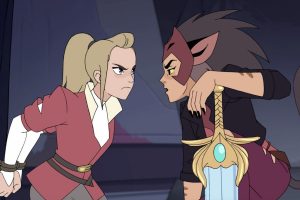
However, something that sets Harley Quinn apart is that the series is exclusively for adults, meaning that its audience is necessarily limited. That’s not a problem that faces Netflix and DreamWorks, whose collaboration on the animated reboot of She-Ra And The Princesses Of Power is something that can be enjoyed by all ages – the fifth and final season premiered on the streaming service just recently, and made the hopes and dreams of the series’ many LGBTQ+ fans finally come true when lead characters Adora (a.k.a. She-Ra, Princess of Power) and Catra rekindled their friendship: which turned into a slow-burn romance, which culminated in the two confessing their love for each other in the series finale, kissing, and saving the world with the power of love. That, my friends, is representation done right – because as much as I enjoy seeing “casual” representation (such as the cop from Onward, who simply mentions her girlfriend without making it a big deal), I infinitely prefer seeing characters whose sexuality or gender identity is something that actually helps to define who they are. And with Adora and Catra, whose relationship has been at the heart of She-Ra for all five seasons, it made complete sense that their love would play a huge part in the conclusion to the story – and it did, because showrunner Noelle Stevenson is a brave, brilliant genius, who fought to make sure that she wouldn’t have to pull a Legend Of Korra on her fans and just have Adora and Catra hold hands and/or gaze platonically at each other.

Finally, we have to talk about Out. Though Disney+ is still new and working out many of its flaws, they did just recently make a big step forward – or rather, Pixar did it for them and Disney+ gets to take the credit: Out, the newest of Pixar’s animated Sparkshorts which debuted exclusively on the streaming platform, follows a gay man in an interracial relationship as he struggles to come out to his parents. Even though the story involves an unpredictable magical mishap and a lot of dog humor, it never loses sight of its true focus, which is a heartwarming message of acceptance. The short, which clocks in at around nine minutes long, is an understated milestone, becoming the first Pixar story to star a gay lead – and much to its credit, enjoyed a spot on Disney+’s top trending section, which shows that audiences are curious and eager for more content like this.
And so, as we head into Pride Month coming off of small successes like Harley Quinn, She-Ra and Out, I must ask of all my readers that you keep fighting for change in any way you can: whether that means demanding more LGBTQ+ representation from Hollywood, or protesting police brutality because black lives matter – or, preferably, by doing both. One day, we will see that change, and it will come from people like you. 2020 is a wake-up call for all of us: to fight harder. To do better.
